One great way to spend time outdoors is to garden. I've always enjoyed being outside and gardening, but it took on special significance for me when I was recovering from an extended illness. As I began to heal—despite still struggling physically and mentally—I felt compelled to greatly expand my garden beds and the variety of things I planted. The experience seemed to accelerate my recovery. It felt like even as I was building the garden, it was helping me come back to life. One day, as I stood in the afternoon sunlight and looked with amazement at all that had grown, I felt my own strength returning along with it.
My dad always had a garden when I was a kid, and now I understand more about what drew him to it. This personal experience, along with numerous studies on the benefits of time spent outdoors, made me curious to explore the many mental health benefits of gardening.
This article delves into those benefits. We'll explore the science behind gardening's positive effects, including the concept of horticultural therapy and the psychology of gardening. We'll also look at gardening mental health statistics, which provide compelling evidence of its positive impact on mental wellbeing. Whether you're a new, seasoned, or senior gardener, the act of growing can boost your mental health on an ongoing basis.
Understanding Horticultural Therapy
Horticultural Therapy (HT) is an ancient practice but a relatively new profession. It has been defined as the use of plants and plant-based activities for the purpose of human healing and rehabilitation. The “roots” of horticultural therapy were established in the early 19th century by Dr. Benjamin Rush—a physician considered the first psychiatrist and a signer of the Declaration of Independence. Dr. Rush observed and documented the positive effects of working with plants on patients at his Philadelphia clinic, which led to the integration of horticultural therapy as a treatment for individuals with mental illness.
Also known as therapeutic horticulture or social horticulture, horticultural therapy uses plants and gardening activities to enhance physical, mental, emotional, and social well-being. It's a holistic approach that engages individuals with nature to foster healing and promote positive outcomes.
This practice is increasingly recognized for its effectiveness in mental health treatment. Professionals use horticultural therapy in diverse settings including hospitals, rehabilitation centers, and schools. The therapy supports individuals with a wide range of needs and challenges. Its benefits are profound—it encourages physical activity, boosts cognitive skills, and improves emotional wellbeing. Many participants report feeling more relaxed and focused both during and after therapy sessions.
Understanding Nature Therapy
Nature therapy involves activities that connect us with the natural world. Gardening can play a significant part in this therapeutic practice that’s linked to reduced stress levels and improved mood. Studies show that exposure to nature can lower cortisol levels. Cortisol is a stress hormone, and lower levels are beneficial for mental health. So, engaging with nature leads to a calmer and more balanced state. The concept of biophilia also plays a role here. It suggests an innate human desire to connect with nature; this connection enhances our sense of wellbeing and happiness. Nature therapy emphasizes the restorative power of natural settings. Spending time surrounded by plants and greenery can enhance focus and creativity. It’s a powerful antidote to modern life’s digital stressors, and can give us a sense of agency in the face of crises like climate change. Incorporating nature therapy into daily routines can be simple. Even a brief walk through a garden or sitting in a park yields benefits.
Gardening for Mental Health: Studies and Statistics
There are many studies and statistics that reveal significant insights into the mental health benefits of gardening. Research consistently shows those who garden regularly experience better mental health. The impact of gardening on emotional wellbeing is evident. In 2021, the UK’s Royal Horticultural Society released research revealing those who garden daily have wellbeing scores 6.6% higher and stress levels 4.2% lower than people who don’t garden at all. Surveying more than 6,000 people, the research demonstrates a significant link between more frequent gardening and improvements in wellbeing, perceived stress, and physical activity.
The Rutgers University Department of Plant Biology website agrees, “An increasingly large body of research attests to the unique values of horticulture as a therapeutic modality for people with physical, mental, emotional, and social disabilities, as plants are non-discriminating and non-threatening, and anyone can be successful utilizing this medium.” A HealthCentral article quotes Hannah Brents, LICSW, of Safe Talk Therapy in Boston. “Putting your hands in the soil releases feel good chemicals in the brain and grounds the nervous system,” she explains.
Gardening can change how well you pay full attention to a single activity. If you struggle with staying focused on tasks, conversations, or topics in your daily life, gardening can help you learn to concentrate on what’s right in front of you without getting distracted. Studies show that outdoor activities can reduce similar symptoms of ADHD.
A 2023 University of Colorado study found that “Study participants…saw their stress and anxiety levels decrease, with those who came into the study most stressed and anxious seeing the greatest reduction in mental health issues.” Plus, the study “confirmed that even novice gardeners can reap measurable health benefits of the pastime in their first season.” Indoor gardening can also provide year-round benefits. A 2015 study found that “interaction with indoor plants may reduce psychological and physiological stress by suppressing autonomic nervous system activity in young adults.”
There are many other universities, community agencies, and other research entities who continue to study and publish data on the tangible effects of gardening. Not only does it improve day-to-day mood, but it also contributes to long-term mental and overall health. As the demand for natural therapies grows, these studies and statistics gain importance. They underscore the therapeutic potential of gardening in diverse settings.
The Psychology of Gardening
What is it about gardening that so deeply benefits the mind? At its core, tending to a garden connects us directly with nature, tapping into a fundamental human instinct to nurture life. Caring for plants offers a quiet sense of achievement and meaning—watching something grow because of your effort is inherently rewarding.
The physical act of digging, planting, and pruning provides a sensory-rich experience. Touching the soil, feeling the textures of leaves, and smelling fresh earth can ground us in the present moment. This sensory immersion often brings calm, helping to ease anxiety and lower stress levels naturally.
Gardening also introduces structure into our lives. Watering plants, following seasonal cycles, and performing regular maintenance create a routine that’s especially beneficial for those facing emotional or psychological challenges. Predictable, small tasks bring stability, a steady rhythm in a world that often feels chaotic.
At the same time, working with nature teaches flexibility and acceptance. We can't control the rain, the wind, or the pests that show up unexpectedly. These small lessons in letting go build resilience and patience.
Finally, garden spaces are a canvas for creativity. Choosing colors, layouts, and plant combinations lets us express ourselves in a deeply personal way. That creative freedom can feel restorative and energizing, bringing balance to both mind and spirit.
Key Benefits of Gardening for Mental Health
Spending time in the garden does more than beautify your surroundings—it can also transform your state of mind. Gardening is a natural way to lift your mood and ease stress. The simple, repetitive nature of tasks like planting, weeding, or watering has a calming rhythm to it. There's something deeply grounding about digging your hands into the soil, inhaling the scent of herbs or blossoms, and soaking in the colors around you. These sensory experiences help you reconnect with the present moment and bring a sense of peace.
But the mental health benefits of gardening reach even further:
Improves mood. Gardening can make you feel more peaceful and content. Focusing your attention on the immediate tasks and details of gardening can reduce negative thoughts and feelings and can make you feel better in the moment. Just spending time around plants eases stress for many people.
Encourages movement – It’s a gentle but effective form of physical activity that supports overall health.
Builds community – Gardening in a community setting, whether it’s working together in a shared garden or simply exchanging tips with neighbors, fosters connection and teamwork. Collaborating with others toward shared goals not only strengthens social bonds but also builds a sense of belonging and support, which can have a positive impact on your mental health.
Boosts self-esteem. Self-esteem is how much you value and feel positively about yourself. Helping a plant grow is a big feat. When you see your work pay off with healthy plants, your sense of pride gets a boost.
What’s great about gardening is that it’s for everyone—young or old, experienced or just starting out. It can be as simple as a few pots on a windowsill or as elaborate as a backyard oasis. However you approach it, gardening offers lasting support for mental wellness in a world that rarely slows down.
Lifting Your Mood and Easing Stress Through Gardening
There’s something almost magical about how being outside and working with the earth can shift your mood. When you dig into the soil, you’re not just planting seeds—you’re also coming into contact with natural microbes that have been shown to support brain chemistry. One of them, Mycobacterium vaccae, may help boost serotonin, a chemical in the brain that plays a big role in how happy and calm we feel.
Add in the benefits of sunlight, and it’s easy to see why gardening can be such a mood booster. Soaking up natural light helps your body produce vitamin D, which is linked to emotional well-being. Sunlight also helps regulate your sleep cycle, making it easier to manage stress day-to-day.
The repetitive nature of gardening tasks—like pulling weeds or gently watering plants—has a calming rhythm to it. These quiet moments create space to unplug from daily worries and just be.
Gardening and Brain Health: A Natural Way to Stay Sharp
Gardening isn’t just good for the body and soul. It’s also a workout for the brain. The act of planning garden layouts, remembering plant needs, and solving unexpected problems (like surprise pests or unpredictable weather) keeps the mind engaged and active. Over time, these small but consistent mental challenges can help strengthen memory, focus, and overall cognitive function.
For older adults especially, tending a garden may do more than pass the time. It could help slow down age-related cognitive decline. Research suggests that people who garden regularly may face a lower risk of developing dementia. The ongoing mental stimulation gardening provides is thought to play a role in preserving brain health and promoting longevity.
From remembering planting schedules to adapting to changing seasons, gardening is full of opportunities to think, learn, and grow—mentally and emotionally. It’s a peaceful yet purposeful way to keep your brain sharp while enjoying the outdoors.
Physical Health and Exercise
Gardening is more than just a peaceful pastime—it’s also a great way to keep your body moving. Simple tasks like planting, digging, pruning, or even carrying watering cans engage different muscle groups and promote flexibility. These natural movements gently build strength, improve balance, and boost your endurance over time.
Because it’s low-impact and adaptable, gardening is a form of physical activity that works for people of all ages and fitness levels. Whether you’re stretching to reach a branch or squatting to pull weeds, you're supporting your body in ways that enhance mobility and overall health.
It also offers a cardiovascular benefit—especially when you're out there regularly and breaking a light sweat. Plus, growing your own fruits, vegetables, or herbs gives you more control over your food choices. You get the added bonus of fresh, nutrient-rich produce, which can support gut health, energy levels, and overall wellness.
In short, gardening is a sustainable way to stay active, enjoy the outdoors, and take care of both your body and mind—one plant at a time.
Cultivating Connection: How Gardening Builds Community
In today’s fast-paced and often isolating world, it’s easy to feel disconnected. Gardening, especially when done alongside others, can be a powerful antidote to loneliness. Whether you're tending a plot in a community garden, joining a local gardening club, or simply swapping seeds and advice with a neighbor, these shared experiences create meaningful opportunities for connection.
Working side by side with others toward a common goal—whether it's growing food, beautifying a shared space, or learning new skills—naturally encourages conversation, cooperation, and camaraderie. Over time, those casual chats while pulling weeds or planting seedlings often grow into genuine friendships.
Beyond personal relationships, gardening also helps strengthen the fabric of a community. It fosters a sense of belonging and mutual support, where everyone contributes and benefits. Community gardens often become hubs of activity and inclusion, where people from all walks of life can come together, learn from one another, and feel part of something bigger than themselves.
These social connections have a real impact on mental health. Feeling seen, supported, and valued by others helps reduce stress and feelings of isolation, while increasing emotional resilience. And when we build these networks in the soil of shared purpose, the benefits can bloom far beyond the garden gate.
Starting Your Garden for Mental Wellness: A Simple Guide
If you’re thinking about starting a garden to support your mental health, you don’t need a green thumb or a huge plot of land—just the willingness to begin. Gardening is a practice that can meet you wherever you are, whether you have a big backyard, a small balcony, or even just a sunny windowsill. The key is to start small, stay curious, and let the process unfold naturally.
Step 1: Find Your Space
Look around and identify an area where plants can thrive. This might be a corner of your yard, a few pots on your porch, or a set of planters on a windowsill. The most important factor is access to light—most plants need several hours of sunlight a day, so choose a spot that stays bright for a good portion of the day.
Step 2: Choose the Right Plants
Pick plants that suit your environment and lifestyle. If you’re working with limited space or sunlight, herbs like basil, mint, or parsley do well indoors. If you have more room outdoors, you might try vegetables like lettuce, cherry tomatoes, or beans. Native plants and low-maintenance flowers can also be a great choice, especially if you’re new to gardening.
Step 3: Gather Your Tools
You don’t need much to get started. A few basic tools will make your work easier:
A hand trowel for digging
Gardening gloves to protect your hands
Pots, planters, or raised beds
Quality potting soil and compost
A watering can or hose
Step 4: Make a Simple Plan
Sketch out what you’d like to grow and where it will go. Think about plant heights, spacing, and how much light each one needs. This step doesn’t need to be perfect—just a loose guide to help you feel organized.
Step 5: Start Planting
Follow the instructions on your seed packets or plant labels. Dig, place your seeds or seedlings, and gently pat the soil around them. Water carefully, and take a moment to enjoy the act—this is where the healing begins.
Step 6: Tend Your Garden Regularly
Consistency is key. Make watering and weeding part of your weekly routine. Check in with your plants, notice changes, and celebrate new growth. These small acts of care are also small acts of self-care.
Step 7: Harvest and Enjoy
When the time comes, gather your herbs, vegetables, or flowers and enjoy what you’ve grown. Whether it’s adding fresh basil to your meal or placing a flower in a vase, this is the reward of your attention and effort.
Step 8: Grow with Your Garden
As your confidence builds, try adding new plants or experimenting with different gardening methods. Maybe you join a local garden club or start composting at home. Let your garden evolve alongside you.
Final Thought:
Gardening isn’t just about growing plants—it’s about nurturing your mind, body, and spirit. With each seed you plant, you’re also planting intention, patience, and care for yourself. So take it one step at a time, and let nature do what it does best: help things grow—including you.
Conclusion
Gardening is far more than a hobby—it’s a powerful form of therapy that nurtures both body and mind. Whether you’re planting a single herb on your windowsill or tending to a vibrant backyard plot, the simple act of caring for plants brings countless mental health benefits. It helps reduce stress, improves mood, and offers a deep sense of presence and purpose.
From personal stories of healing to scientific studies on horticultural therapy, the evidence is clear: gardening fosters emotional resilience, boosts cognitive function, and encourages physical movement. And when done in community settings, it strengthens social bonds and creates meaningful connections that support long-term mental wellbeing.
Starting your own garden doesn’t have to be complicated. With a bit of space, a few tools, and a willingness to learn, anyone can begin. It’s a journey of growth—for both your plants and yourself.
So whether you're recovering from illness, looking for a mindfulness practice, or simply want to feel more grounded in your everyday life, gardening offers a natural, accessible path to healing. Step outside, dig in, and let your garden grow—because as you nurture it, it just might help you bloom too.
💬 A Note from me(author)…
If you’re finding value in my writing and it’s helping your research or opening your eyes to new ideas, know that it truly means a lot to me. I write full-time here on Substack, and this platform is how I support myself and my family.
If you'd like to support my work and help me continue, consider becoming a paid subscriber. Not only will you be making a real difference, but you’ll also gain access to exclusive content, early releases, and deeper insights only available to subscribers.


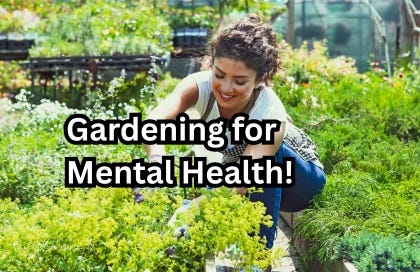


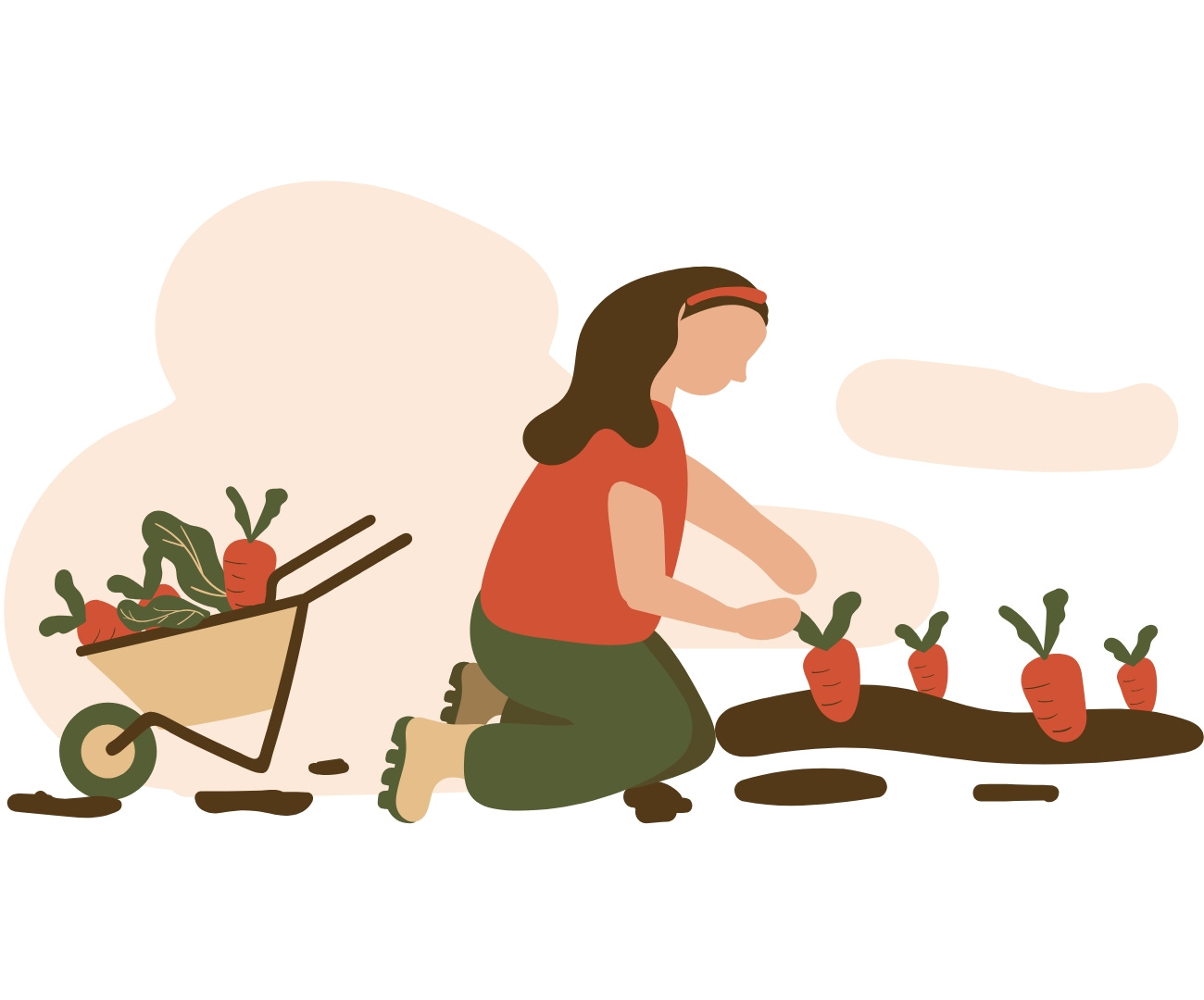
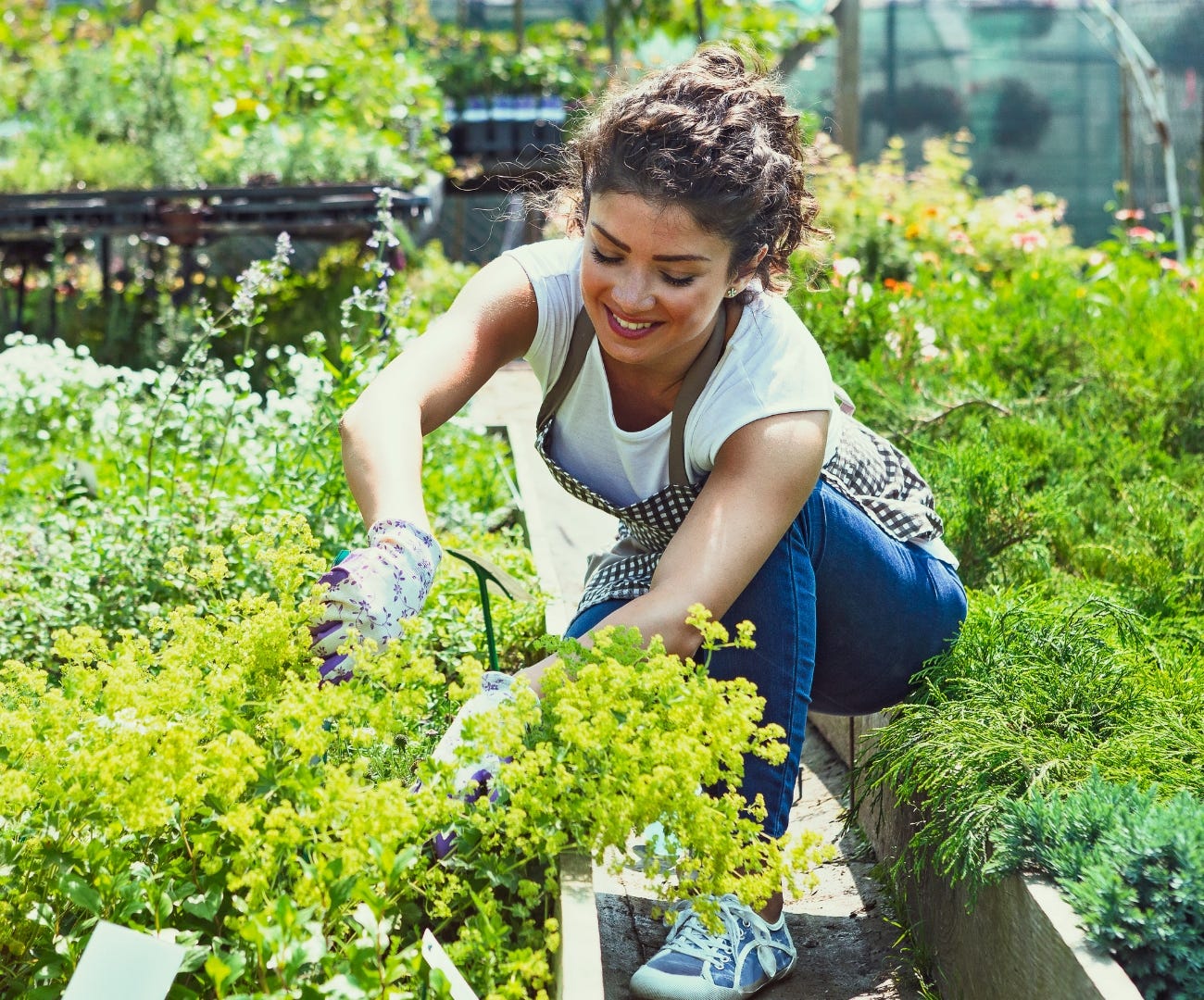
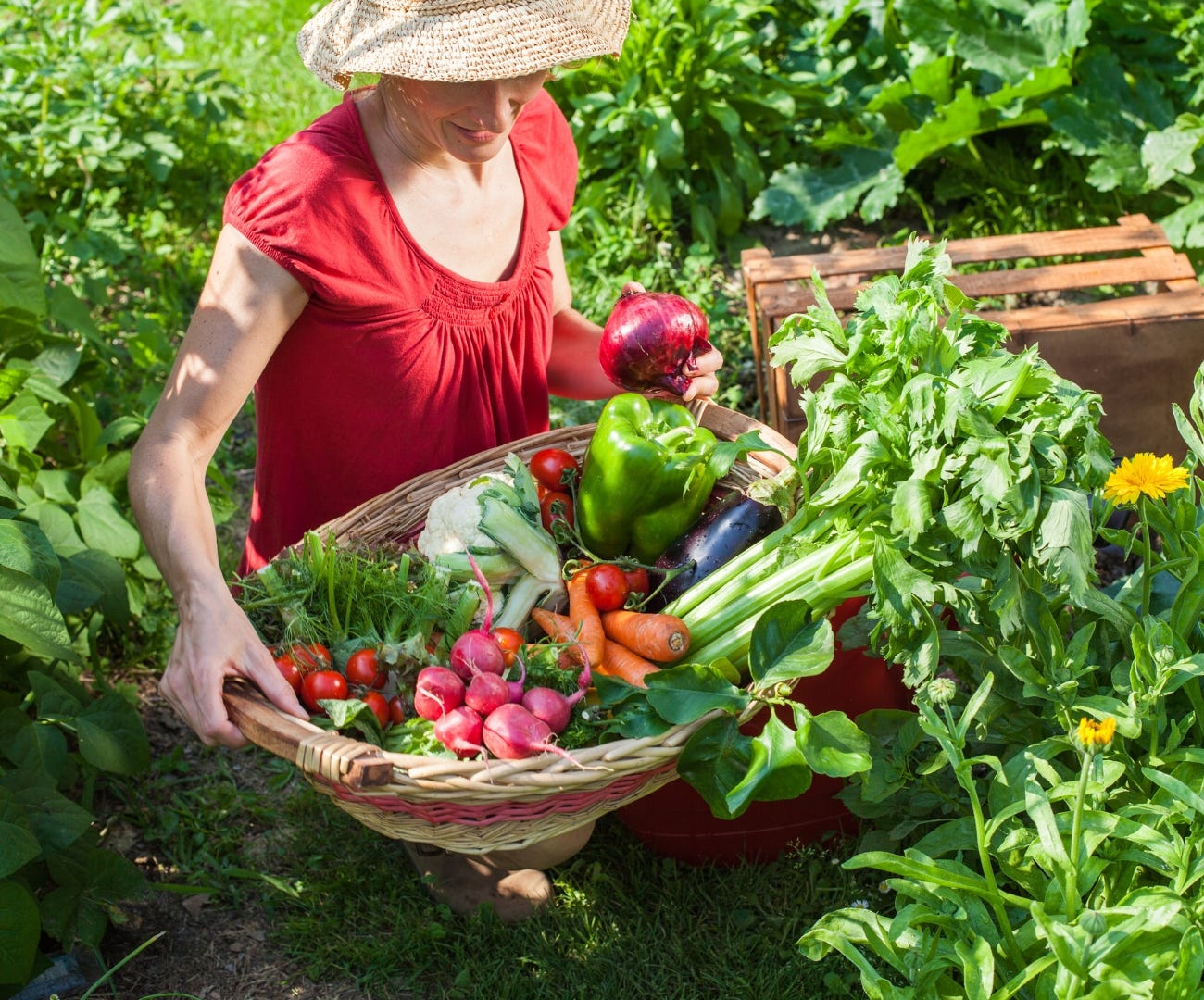

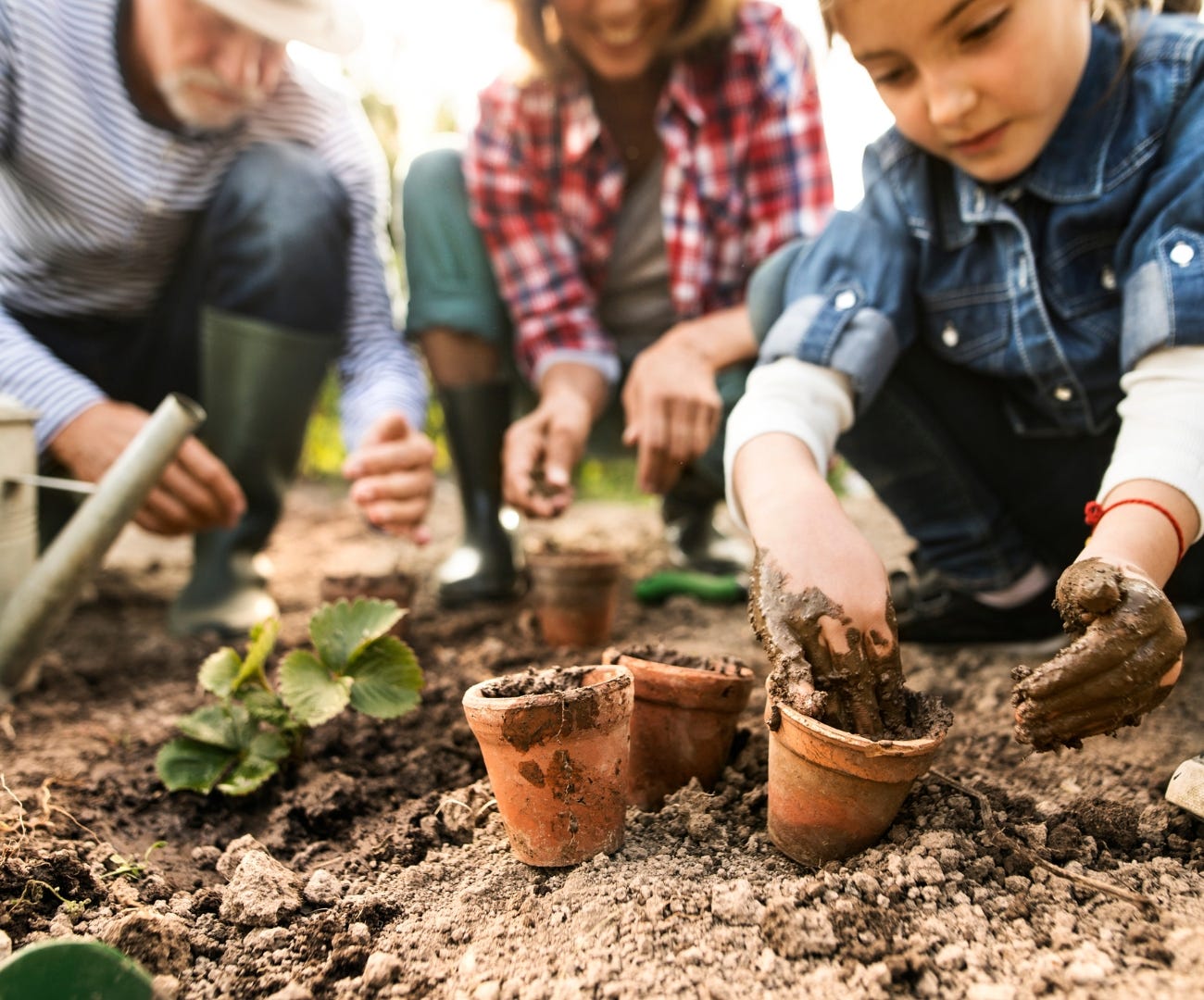

I couldn’t agree more with many of the things you’ve written in this lovely post. I’ve been gardening for about five decades now, and I would also say that gardening connects one to the true life force coming from our planet earth. And research shows that just being in a garden and surrounded by plants will lower your blood level of cortisol. You can’t fool your body, it knows when you’re giving it something really good, like an afternoon in your luscious garden!
When I first started gardening, it was more about food for humans, but over the decades I’ve grown more and more different kinds of native plants that provide so much more than food. They provide habitat and food for fauna that support the web of life.
Time in nature truly does heal your physical, emotional, and spiritual body. I can thank my garden for not only providing me food, but a supportive environment to help me learn and grow every day of my life. Just yesterday, I got to watch a purple Martin splash with wild abandon in the water from one of my fountains. Pure joy! Give me the simple life.